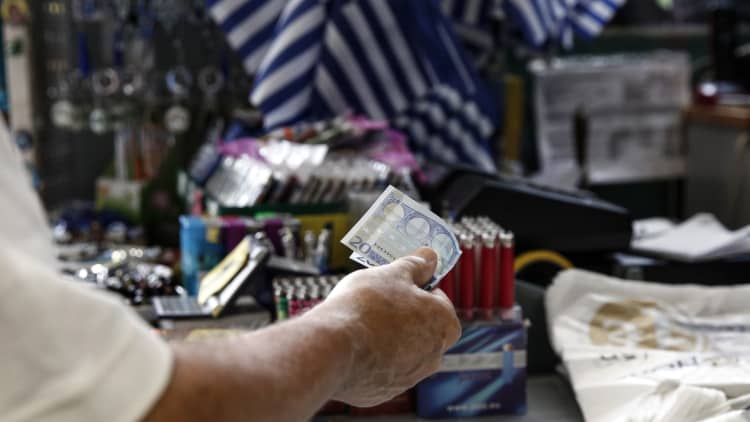
Greece woke up on Monday to a new life under austerity and reforms: Not only were the country's banks reopened and Athens had started paying back its debts, according to some reports, but businesses owners had to deal with a big hike in sales tax. And experts are worried over the effect the hikes will have on consumer demand and wider economic growth.
The sales tax that Greeks have to pay on a range of goods and services- from every products to taxis and restaurants, rose on Monday from 13 percent to 23 percent as the Greek government implements reforms in return for a third bailout package.
It is estimated that the new hikes will cost Greeks 1,500 euros ($1,625) per year on average in an effort to generate 5 billion euros in revenue for the government, according to Greek newspaper Proto Thema.
The sharp rise in the sales tax on hundreds of products (including essentials like meat, sugar, sliced bread, coffee and canned foods) means that prices will automatically rise 9 percent, the paper said.
Tax changes 'confusing'
The changes to Greek taxation follow the Greek government's reluctant capitulation to lenders' demands for reforms in return for a third bailout package worth 86 billion euros. The tax increases were a last-ditch bid by the government to show lenders that it was serious about reforms in return for aid to stave off bankruptcy and a potential exit from the euro zone.
Read MoreGreece starts paying back the ECB, IMF: Report
Dorina Stathopoulou, manager of the Plaka Hotel in Athens, told CNBC that the tax hikes were necessary to increase government revenues, but nonetheless, the changes were confusing.
"The fact that they've raised taxes is to be expected but the problem is the way they've chosen to do the taxes, it's confusing," she said on Monday.
The 23 percent sales tax hike on hotels comes into effect on October 1 in a bid to avoid hitting this year's tourism season. Greek islands which had enjoyed discounted VAT rates will also see tax rises in October. Tax increases on restaurants were not delayed, however, and came into effect on Monday. Stathopoulou said the different taxes on various products would make for confusion in restaurants.
"For example, spaghetti without meat will have a 13 percent tax rate but spaghetti with meat will be taxed at 23 percent, so it becomes complicated. How are we supposed to make a menu in these circumstances?" Stahopoulou said. "It's like we are back in the second world war and meat is a luxury again."
Wilting businesses
Greeks have rounded on the rate rises for their seemingly random logic: While transport services, such as buses and taxis, cinemas and florists have seen tax rises of 10 percentage points, the levy paid on theater tickets, books and medicines has fallen slightly, from 6.5 percent to 6 percent.
Alexis Geros, the owner of Athens-based florist Anthemion Flowers, told CNBC that the overnight tax increases (from 13 percent to 23 percent) were terrible for his business.
"The floristry business is not good now. We haven't passed the tax rises onto our customers --already people don't have the money to spend on flowers. So it's being lost from our profits. It's terrible for us."
Geros said that business had by decreased 70 percent in the last three weeks, during which there was a period of capital controls in Greece limiting withdrawals, and that that had created an already tough situation for his business.
"In the last three weeks, nobody has bought anything at all, apart from food. No shoes, clothes, flowers, furniture. They've only bought the essentials."
He believed the tax increases were a bad move by the government, saying that "businesses can't grow if you have high taxes," he added that Greece and Europe were making a "big mistake" with the bailout package as a whole.
Read More Awkward! It's tough being rich in Greece
Squeezing the economy
Greece relies heavily on its travel and tourism industry for much of its revenues, making travel a prime taxation target for the government.
Pavlos Yeroulanos, former Minister for Culture and Tourism in Greece, told CNBC that the new measures would squeeze the last drops from the Greek economy.
"You can drain the existing Greek economy until you've squeezed every penny out of it and eventually, even productive businesses will start thinking of other options – whether some people will go into the black economy or others will just leave the country and go elsewhere."
"But the challenge is not how to milk the existing economy but how to grow it, how to help Greeks create more businesses and more wealth-creating mechanisms."
"To do that you need to have to reform the state very radically, bring Greek banks into the 21st century, change the education system….once Greeks reach their full potential it will be easier for the government to collect the money that it needs to meet its obligations."
- By CNBC's Holly Ellyatt, follow her on Twitter @HollyEllyatt. Follow us on Twitter: @CNBCWorld


